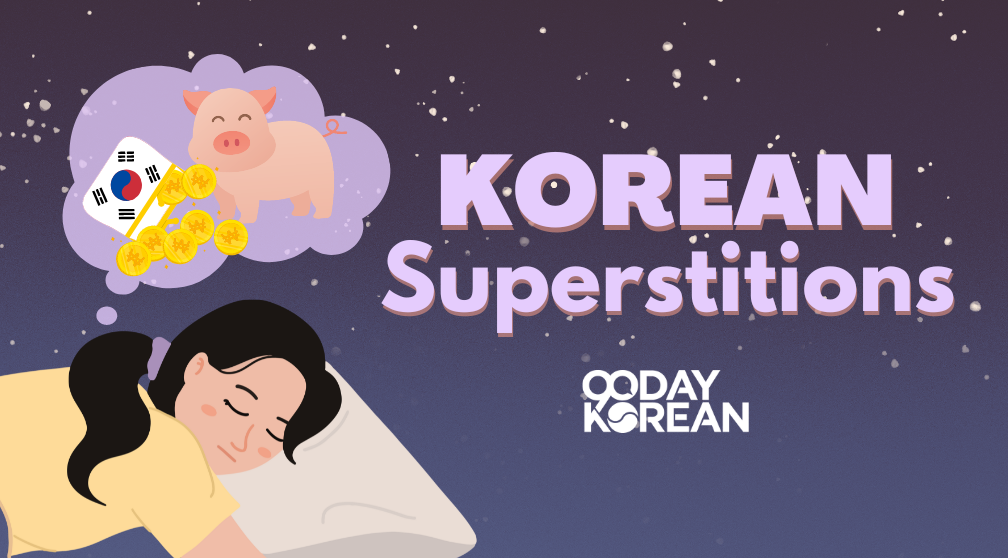Korean superstitions are not only interesting, but they’re still widely used today in Korea. It’s a fun way to learn about cultural norms, especially living or traveling in Korea.
Superstitions in Korea are unique, engaging, and helpful to learn, especially for travelers.
Contents
- 1 Korean Superstitions List
- 1.1 Moving on Certain Days is Bad Luck
- 1.2 Korean Fan Death Myth
- 1.3 Whistling at night
- 1.4 Number Four (Bad Luck Symbols)
- 1.5 Beautiful Food, Beautiful Kids
- 1.6 Don’t Give Shoes as Gifts
- 1.7 Don’t Shake Your Legs
- 1.8 Avoid Writing Names in Red Ink
- 1.9 Dreaming of Pigs is a Sign of Good Luck
- 1.10 Eating 엿 (yeot) Brings Good Luck
- 1.11 Avoid Jumping Over Your Baby
- 1.12 Don’t Touch Your Eyes After Touching a Butterfly
- 1.13 Korean Good Luck Charms
- 1.14 Korean Lucky Numbers
- 2 Wrap Up
Korean Superstitions List
Although not everyone believes these superstitions, most people do know about them. The Korean superstitions below can be some great conversation topics, especially if you have some Korean friends. We’ve listed the top 14 South Korean superstitions for your reading enjoyment.
Moving on Certain Days is Bad Luck
It’s moving day, so make sure you have everything packed. Favorite athletic pair of shoes? Check. Giant coffee mug from a trip to India? Check. Evil spirits? Best to leave those behind!
According to folklore, this activity will prevent the ghosts from heading into the heavens if you block them with your moving activities on certain days. Luckily, a calendar will help you choose the correct dates to move according to this superstition.
Follow this calendar and make sure that you keep bad luck away from yourself. The calendar title is called “손없는날 달력” (soneomneunnal dallyeok | evil spirit-free day calendar). 손 (son) means “evil spirit.” Stay away from the dates on the calendar with “손없는날 (soneomneunnal)” written on it!
Korean Fan Death Myth
Have you heard of the Korean Fan Myth? Yes, you’ve read that correctly. Although the death threat caused by electric fans to some Koreans is a mystery to many foreigners visiting Korea, the Korean Fan Death myth is one of the more common Korean superstitions.
Although there’s no scientific evidence that Korean fan death is a real thing, some Koreans still believe that electric fans can cause death. According to this Korean superstition, the cause of death is that the fan creates moving air around your face. That moving air makes it hard to breathe, so people suffocate.
Not all fan situations are wrong, though. This superstition says that you’re good to go if you have some windows or doors open. However, if you close the windows and doors in a room with a fan on, you’re asking for trouble.
It’s such a widespread belief in South Korea that many consider the fan timer a lifesaving function. The Korean phrase for “fan death” is 선풍기사망설 (seonpunggisamangseol).
Whistling at night
Whistle while you work? Sure, that shows you’re a happy person. Whistling at night? It’s probably not a great idea if you believe in Korean superstitions.
So, what happens if you whistle at night? According to Korean superstitious beliefs, snakes love a good whistle tune at night. Some also believe that whistling at night summons Korean demons and other creatures not from this world.
If you have to, schedule the whistling sessions after sunrise!
Number Four (Bad Luck Symbols)
The number four is bad luck in South Korea. This is common in other countries in Asia, too. It’s similar to the superstition in the western world about the number 13.
Apartments with multiple “4s” have a lower value since many see them as bad luck.
The Korean word 사 (sa) means “four,” and it also means “death.” Follow this Korean superstition to keep good luck flowing your way! For more on numbers and counting in Korean, check out our complete guide here.
Beautiful Food, Beautiful Kids
Some superstitious Koreans believe that the appearance of your food contributes to the appearance of your kids. This means Korean food is not only delicious, it apparently can determine your children’s future appearance!
Let’s take a kimbap, for example. If you look at a sliced kimbap, the middle pieces are more organized and look more appealing than the ends.
According to this superstition, if a mother eats the middle pieces while pregnant, she has fortune on her side to bring her some good-looking offspring.
If the mom loves to chow down on the kimbap ends, then she’s less likely to have to worry about her children becoming celebrities. Keep this Korean superstition and other Korean table manners in mind next time you have your meal.
Don’t Give Shoes as Gifts
Aside from the fact that it’s hard to find someone’s correct size, giving shoes as gifts in South Korea is a no-no. Koreans who believe in this superstition believe that giving shoes will cause the receiver to run away.
Thinking about giving your girlfriend or boyfriend a pair of shoes? Don’t bother. This is especially bad to do with your significant other unless you’re trying to find a subtle way to give a hint!
This is one Korean superstition that you may want to stick to if you care about your relationship. There are plenty of great gifts you can shop for in South Korea, so best to stay away from shoes.
Don’t Shake Your Legs
Not only does shaking your legs distract grandma at the dinner table, but it also brings bad luck your way!
In traditional Korean culture, your legs symbolize wealth and prosperity. Koreans who believe in this superstition think that if you shake your legs, you’re shaking the wealth right out of you. You can say “다리 떨면 복 나간다” (dari tteolmyeon bok naganda).
Avoid Writing Names in Red Ink
It’s bad luck to write names in red ink. The main reason is that the names of the deceased used to be written in red ink. Therefore, if you write someone’s name in red ink, the superstition says that you’re giving any person a death wish!
You’re safe with other words in red ink, but make sure the names stay in standard blue or black ink.
Better to keep those bright colors for special occasions and avoid this Korean superstition altogether.
Dreaming of Pigs is a Sign of Good Luck
If you wake up from a dream and feel like you just got back from a trip through an animal farm, you may be in for some good luck!
The pig symbolizes good luck, wealth, and fortune in Korean culture. If you believe in Korean superstitions and you wake up with pigs on your mind, you may have wealth, a promotion, or other good luck coming up in your future.
Eating 엿 (yeot) Brings Good Luck
엿 (yeot) is traditional Korean taffy made from glutinous rice. Because of its stickiness, this Korean superstition says that it will cause good luck to stick to you.
This principle of eating sticky food will make good luck stick also applies to exam answers. Eating 엿 (yeot) while studying will help knowledge stick in students’ minds. Students who believe in this Korean superstition will often eat it before exams to help them recall the correct answers.
Avoid Jumping Over Your Baby
Superstitious Koreans believe that if you jump over your baby, they won’t grow tall.
Since it’s dangerous to jump over your baby anyway, this is one Korean superstition that everyone should follow.
Don’t Touch Your Eyes After Touching a Butterfly
A Korean superstition says that if you touch a butterfly and then touch your eyes, you’ll go blind.
If you find yourself around butterflies (or moths), you may want to follow this Korean superstition and keep some wet napkins nearby or stop at the closest sink.
Korean Good Luck Charms
Like many countries in Asia, Koreans associate objects and trinkets with luck and fortune. Many traditional Korean charms are used to get wealth and ward off misfortune. One example of Korean Good Luck Charms is the Pujok, a piece of paper (typically yellow) with symbols and patterns inscribed. The Korean talisman is said to ward off evil spirits and bring good fortune.
Korean Lucky Numbers
So we already know that the number 4 is unlucky in South Korea as it is associated with death. But did you know that there are also Lucky numbers in Korea? Similar to many Asian cultures, specific numbers are said to be associated with luck and prosperity. In Korea, numbers like 8, 9, and 3 are often considered lucky.
Wrap Up
Having these signs of good luck coming into your life seems exciting! What Korean superstition caught your attention? Do you think Korean superstitions have a place in modern society? We’d love to hear your thoughts. Leave us a comment below!
If you want to learn more about the Korean language, you can check out our structured online course. Our self-paced program can help you learn Korean in just 90 Days! If you want to know more interesting beliefs in Korea, you can find out some of the Korean myths here!















Hi quick guestion if ‘sa’ means death then why does love have it in it ‘saranghaeyo’
Hello! There are two different types of vocabulary in the Korean language and 사랑 (love) is a native Korean word, and 사 as meaning ‘death’ is Sino-Korean word, which is derived from Chinese character. It would be helpful to remember that some Korean words can have the same sound but can mean different things. ^^
I was going to say I found the shoes one strange as I have seen multiple shows where characters gave each other shoes. Then I realized those stories didn’t always end well ????. Thanks for this list!
Awesome! Thanks for sharing, Darcy. ^^
Thank you for those superstitions which i never had heard before
That’s great! It’s our pleasure. We’re glad that it has been valuable to you. ^^
You actually have one mistake in this article. For the 손없는날 달력, you WANT to move on the 손없는날 (son-eobsneunnal)! Which translates to “days without bad luck.” You want to stay away from planning things on the days without those words on it.
Thanks for your explanation! As it is written in the post, ‘손없는 날’ is interpreted as ‘evil spirit-free day’, and that’s when you want to move! ^^
These superstitions are interesting to know. Thank you for sharing these interesting facts. I learned a lot.
Sure, it’s our pleasure. ^^